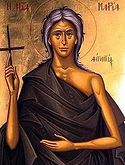

| Previous day | Next day |
| Old Style
April 1
|
Tuesday |
New Style
April 14
|
|
Passion Week.
Great Lent. |
Monastic rule: xerophagy (bread, uncooked fruits and vegetables).
|
![]() St. Mary of Egypt (522).
St. Mary of Egypt (522). ![]() St. Euthymius the Wonderworker, archimandrite, of Suzdal (1404). St. Barsanuphius of Optina Monastery (1913).
St. Euthymius the Wonderworker, archimandrite, of Suzdal (1404). St. Barsanuphius of Optina Monastery (1913).
Martyrs Gerontius and Basilides (3rd c.). St. Macarius, abbot, of Pelecete (ca. 830). Martyr Abraham of the Bulgars on the Volga (1229). St. Gerontius, canonarch of the Kiev Caves (14th c.). St. Pachomius, archbishop of Roman and Galati (Moldavia) and monk of the Kiev Caves (1724).
New Hieromartyr Sergius Zavarin, archpriest, of Yaroslavl (1938). New Hiero-confessor Schema-bishop Macarius (Vasiliev), at the Pskov Caves Monastery (1944).
St. Meliton, bishop of Sardis (177). Martyr Romanus of Raqqa (Syria) (780). St. Procopius, abbot, of Sazava in Bohemia (1053). Sts. John of Shavta, bishop of Gaenati (7th c.-13th c.) and Eulogius the Prophet, fool-for-Christ (13th c.). of Georgia.
Thoughts for Each Day of the Year
According to the Daily Church Readings from the Word of God
By St. Theophan the Recluse

The Sixteenth Sunday After Pentecost. [II Cor. 6:1-10; Matt. 25:14-30]
The parable about the talents offers the thought that life is a time for trading. That means that it is necessary to hasten to use this time as a person would hurry to a market to bargain for what he can. Even if one has only brought bast shoes, or only bast,[1] he does not sit with his arms folded, but contrives to call over buyers to sell what he has and then buy for himself what he needs. No one who has received life from the Lord can say that he does not have a single talent—everyone has something, and not just one thing; everyone, therefore, has something with which to trade and make a profit. Do not look around and calculate what others have received, but take a good look at yourself and determine more precisely what lies in you and what you can gain for that which you have, and then act according to this plan without laziness. At the Judgment you will not be asked why you did not gain ten talents if you had only one, and you will not even be asked why you gained only one talent on your one, but you will be told that you gained a talent, half a talent or a tenth of its worth. And the reward will not be because you received the talents, but because you gained. There will be nothing with which to justify yourself—not with nobleness, nor poverty, nor lack of education. When this is not given, there will be no question about it. But you had hands and feet. You will be asked, what did you gain with them? You had a tongue, what did you gain with it? In this way will the inequalities of earthly states be levelled out at God’s judgment.
[1] Very inexpensive, unsophisticated items.
Articles
 Venerable Euthymius of SuzdalThe ascetic struggles of Saint Euthymius were so great that Saint Dionysius advised him to lessen them. |
 Venerable Barsanuphius of Optina |
 Martyrs Gerontius and BasilidesThe Martyrs Gerontius and Basilides suffered martyrdom for Christ in the third century. |
 Venerable Macarius the Abbot of PeleceteSaint Macarius was born at Constantinople in 785. While still a child, he lost his parents. |
 Martyr Abraham of BulgariaThe Holy Martyr Abraham the Bulgar, Vladimir Wonderworker, lived during the thirteenth century, and was descended from the Kamska Bulgars and brought up as a Moslem. |
 Venerable Gerontius the Canonarch of the Kiev Far CavesHe spent all his life at the monastery, in ascetic deeds of abstinence, obedience, and prayer. |





